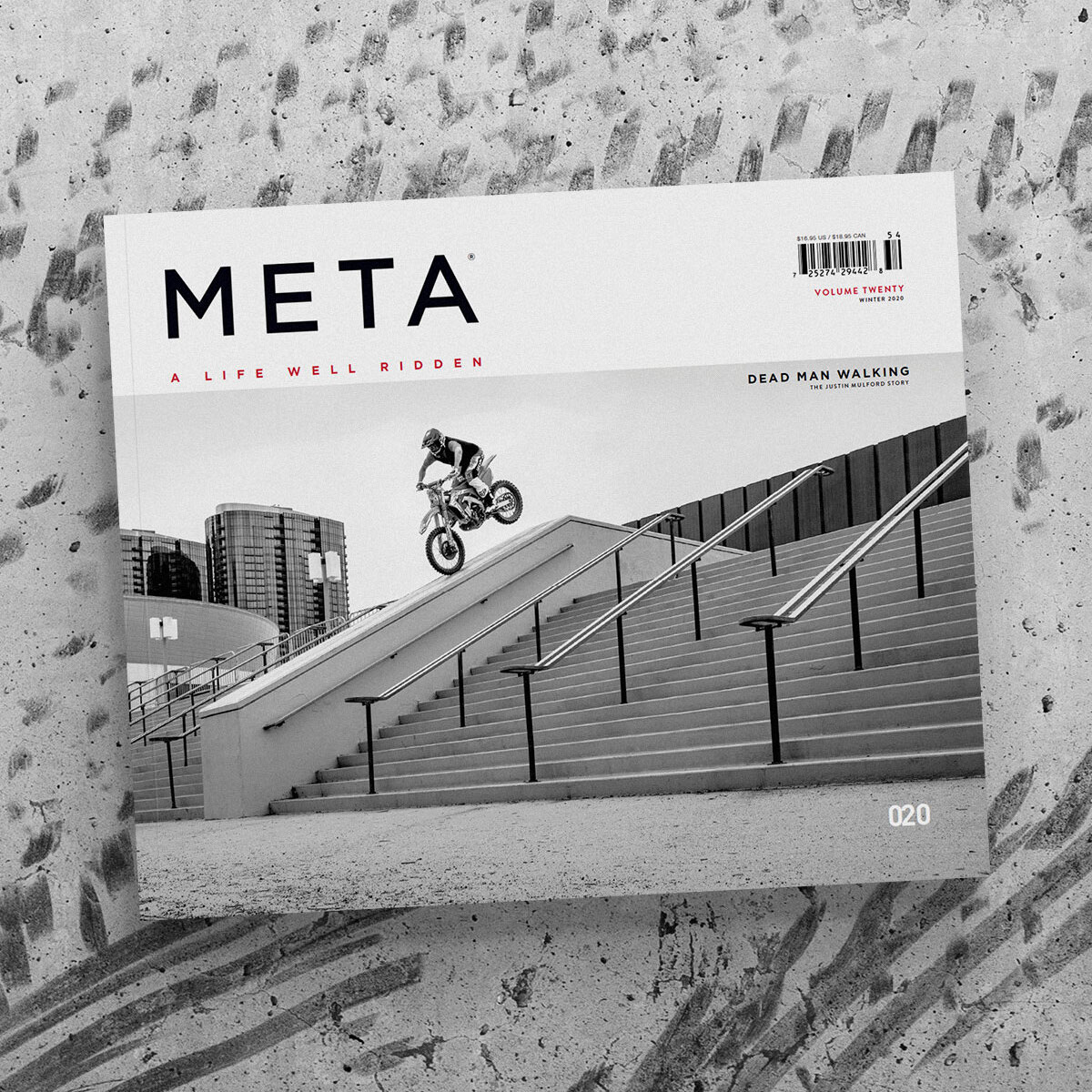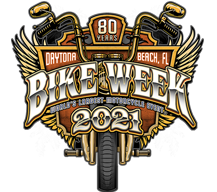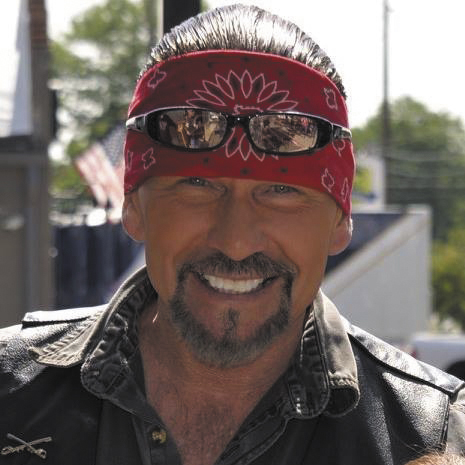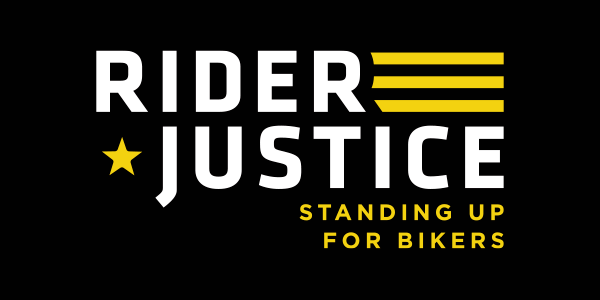
Article courtesy of Rider Justice.
Andrew Campo trusts his gut. Typically, his gut is way ahead of the times… or way behind the times, depending on your perspective. And yet, he gut-trusts his way into some of the most rewarding, mold-breaking work imaginable, achieving success and defying the expectations of all the people who say, “Are you out of your mind?”

Campo is the founder of META, a company focused solely on motorcycles, the motorcycle lifestyle and – of all things – print magazine publication, which is largely considered a dying form of media. But in Campo’s hands, and in the hands of his business partner and Creative Director Ben Giese, META is transcendent. It transcends expectations, norms and previously held beliefs about the power of print.
How did Campo and Giese come to create a wildly successful print magazine and its surrounding company during a time when no one understood or believed in what they were doing? Campo says that “swimming upstream” has always been his way. He also believes that, because he and Ben grew up racing motorcycles, “competition is in our DNA. When people tell you you’re nuts, it’s the fuel that makes you work harder.”

The Journey to META
Back when Campo was in college, he took a magazine writing course and submitted it to Snowboarder magazine via snail-mail. Times being what they were (young internet), it was another six months before the publisher of the magazine called him and offered to publish his story and also offered him a job.
“I quit school and moved to California and worked for that whole group of magazines: Snowboarder, Skateboarder and Surfer,” says Campo. “I worked in just about every department. That was my education.”
While at that publishing group, Campo saw the drawbacks of the print format – mostly that it was slow.
“Fans knew races were occurring but they had to wait two months to get results and coverage because everything was print,” says Campo. “Digital media was just becoming a thing and I realized that we could speed up that information delivery.”
Campo teamed up with Wes Williams to create Vurb, a digital media company focused on the motocross industry. (This is where you start to see how Campo swims upstream.) The new company went to the print magazines and offered to partner and create daily digital content for them, including race recap videos, that would be instantly available to subscribers.
“The industry loved it but nobody had a budget for digital,” says Campo. “They didn’t understand the power of digital yet.”
For three years, Campo and his partners spent their own money operating Vurb, and then the industry caught on.

“We were way ahead of everybody,” remembers Campo. “We went from zero to absolutely killing it. We traveled the world. But then Instagram hit. We were the first company in motocross to have an Instagram account, but the writing was on the wall. Two years in, every team and every athlete and every brand had their own Instagram account. People could get their digital content somewhere else.”
Still, Vurb had a huge following and most people encouraged Campo to stick with it.
He wasn’t having it.
“I didn’t want to reinvent our web publishing strategy. I had always known that my passion was for print publication. It was time to challenge myself again so I teamed up with our Art Director Ben Giese and never looked back.”
So, just as the print industry was starting to collapse under the weight of digital popularity, Campo switched back to print.
“What Are You Thinking?”

Campo immediately faced head-shaking.
“Plenty of people said, ‘What are you thinking? You have massive reach with Vurb! Just adapt to the changes!’” recalls Campo. “I totally understand that they thought I was crazy. When I launched Vurb, a digital media company, print media was strong. Now, people were devouring digital media and I was leaving for print. I can see why they thought I was nuts. But Ben and I aren’t afraid of doing what everybody says we should not be doing.”
Very soon after abandoning Vurb, META was born. The name comes from Roman days when chariot races pounded through the Coliseum (a precursor to motocross?). Campo says that a “meta” was the marker on the track telling the chariot drivers whether to turn left or right.
“META represents our turning point from digital to print,” says Campo.
Like Vurb, META started slowly because, again, Giese and Campo were swimming upstream. Because of previous partnerships that Campo had established in the motorcycle industry, they had enough support to fund volume one of META. From the beginning, it was unlike any other motorcycle magazine anywhere.
First impression: META is absolutely stunning. Artistic, gorgeous, gritty and visually astonishing, META is an ode to the motorcycle, a poem, a love affair, a desperate-pining-away-for-that-which-you-can-hardly-describe-but-know-it-when-you-feel-it. If you ride, you’ve felt it. If you haven’t, META will make you want to.

Central to the magazine and the company’s mission is an aesthetic that is more art-driven than advertising-driven. There are only 14 to 15 advertisers per issue – a stark contrast with a typical magazine, which includes 30 to 60.
“Because we have 14 advertisers, it allows us to work hard for them,” explains Campo, who says that it was hard to explain the concept initially to potential sponsors.
“When I first approached the industry, I asked them not to focus on pricing but to use our platform to focus on their brand history and heritage. That conversation was very interesting. They didn’t get it until they saw it in action. Now, advertisers approach us because of what we can do for their brand.”
A META ad package includes the print magazine, as well as digital products, such as short feature films, on the META website.
“Print is the foundation of everything we do,” says Campo. “With each volume, we create a short feature film to support our cover story. Sometimes, more than one film piece comes out of a volume. Those films allow us to bring global traffic to the site and to create assets for social media. They are also a strong part of our revenue plan. But everything supports the print product.”
From that first volume, META grew to three volumes per year. Finally, in 2019, Campo and Giese believed they had the foundation established to publish four volumes per year, which would be a very strong business model to carry the company forward. Then, COVID.
“I really didn’t know what would happen,” says Campo. “But it turned out that, in 2020, people really craved an interaction with an analog product. They wanted to get off their phones, laptops and TVs. They embraced META in a big way.”
And so, once again, Campo is riding the wave of success while swimming upstream.
Looking for a Different Kind of Partner
Meanwhile, back in 2018, Campo was approached by Chere Martin, Community Liaison with Rider Justice, a motorcycle legal/advocacy organization in Colorado, which is also where META is based. Mostly, Martin was curious to meet the visionary behind the stunning magazine. She and Rider Justice founder, Scott O’Sullivan, also hoped the two Colorado companies might collaborate in ways that serve, promote and protect the rider community.
“I met with Chere two years ago and we just had a really nice, warm conversation,” recalls Campo. “Chere is a designer and a creative and a really cool person. She told me that Rider Justice would like to align with META. They didn’t just want to be advertisers; they wanted to create a true partnership.”
Campo liked the Rider Justice mission, so he met O’Sullivan.
“If you look at Scott’s website… yes, he is a lawyer, but he has no interest in being an ambulance chaser. He’s anything but. He’s a really good human being. You don’t often meet people who practice what they preach, but Scott and Chere do. They have philanthropic values and I had been looking for a way to involve myself in goodwill projects. It made sense to collaborate with Rider Justice, especially after COVID hit.”
Therefore, in early 2020, the two organizations created #2Wheels4Meals, a grassroots bunch of motorcycle enthusiasts who have come together several times to make meals for healthcare workers, the homeless, and other at-risk populations.
“We’ve made something like 2,500 to 3,000 meals since March,” says Campo. “I’m proud to align with them and work on projects with them. And we’re talking about going to a larger scale with our efforts in 2021. We have a lot of mutual respect and we have some great ideas kicking around.”
The META Lifestyle

From the beginning days of META, Campo and Giese decided to create a company that enabled them to live the lives that they desired – outdoors, with family, playing a lot! That dream has also been achieved.
“At times, I feel selfish because my work lets me have so much fun!” says Campo. “At the end of the day, I’m out playing more in a single day than a lot of people will ever play in their entire lives. I’m all about quality of life and that feeds everything we’re doing.”
For example, Campo recently found “the one that got away.” Not a girl; a motorcycle.
Back when he was 15, Honda started making a street bike called The Hurricane. To say Campo fell in love would be an understatement. Campo spent the next eight months waiting for the bike’s release and making plans with his best friend to ride their new bikes together. But, when the time came, Campo’s dad wouldn’t let him get it.
“He said, ‘If I buy you that motorcycle, you’re dead in two weeks.’ He supported my motocross but he didn’t want me on a road racing bike. I was shattered.”
Campo has been looking for his Honda Hurricane ever since. And recently, she came back into his life.
“They are collector’s bikes and very hard to come by. A few weeks ago, I stumbled across one on Facebook marketplace and it was kinda too good to be true. Less than 10,000 miles, great condition, and a low price. Turns out the guy was leaving the country and needed to sell quickly.”
So, Campo got his girl. (Notably, Campo is also happily married to a wife whom he credits with being his number-one supporter, even when his ideas seem like pure lunacy.)
Next up: Campo and Giese plan to publish four volumes of META again in 2021, complete with the moody, surprising, provocative short films that grab global viewers and lure them into the META masterpiece: the Meta magazine. Campo also plans to continue partnering with Rider Justice, hosting events that celebrate and support riders.
“We are in uncharted waters for what things will look like in 2021,” says Campo. “What’s going to happen? I don’t know! But if everything was easy, the product wouldn’t be as good.”
Upstream.






